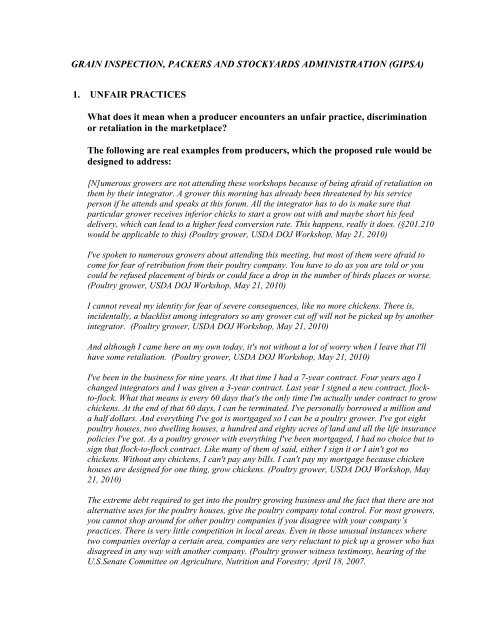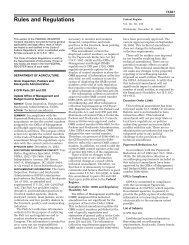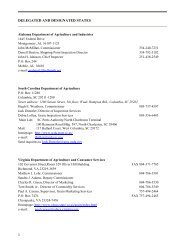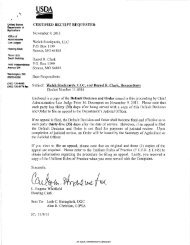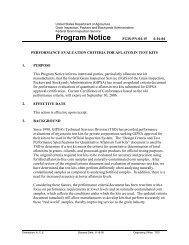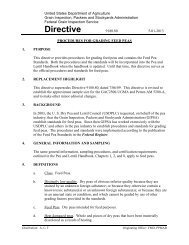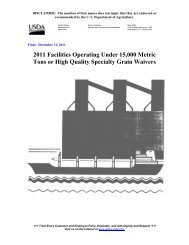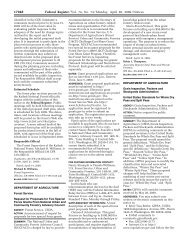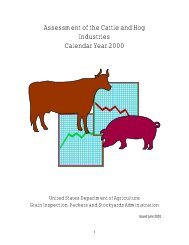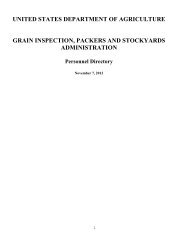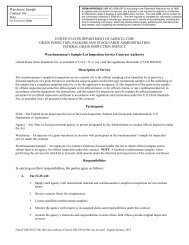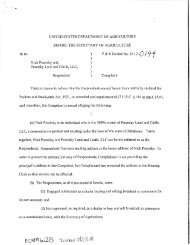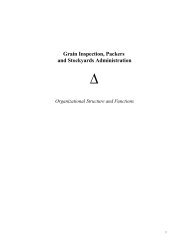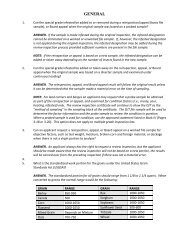1. UNFAIR PRACTICES What does it mean when a producer ...
1. UNFAIR PRACTICES What does it mean when a producer ...
1. UNFAIR PRACTICES What does it mean when a producer ...
Create successful ePaper yourself
Turn your PDF publications into a flip-book with our unique Google optimized e-Paper software.
GRAIN INSPECTION, PACKERS AND STOCKYARDS ADMINISTRATION (GIPSA)<br />
<strong>1.</strong> <strong>UNFAIR</strong> <strong>PRACTICES</strong><br />
<strong>What</strong> <strong>does</strong> <strong>it</strong> <strong>mean</strong> <strong>when</strong> a <strong>producer</strong> encounters an unfair practice, discrimination<br />
or retaliation in the marketplace?<br />
The following are real examples from <strong>producer</strong>s, which the proposed rule would be<br />
designed to address:<br />
[N]umerous growers are not attending these workshops because of being afraid of retaliation on<br />
them by their integrator. A grower this morning has already been threatened by his service<br />
person if he attends and speaks at this forum. All the integrator has to do is make sure that<br />
particular grower receives inferior chicks to start a grow out w<strong>it</strong>h and maybe short his feed<br />
delivery, which can lead to a higher feed conversion rate. This happens, really <strong>it</strong> <strong>does</strong>. (§20<strong>1.</strong>210<br />
would be applicable to this) (Poultry grower, USDA DOJ Workshop, May 21, 2010)<br />
I've spoken to numerous growers about attending this meeting, but most of them were afraid to<br />
come for fear of retribution from their poultry company. You have to do as you are told or you<br />
could be refused placement of birds or could face a drop in the number of birds places or worse.<br />
(Poultry grower, USDA DOJ Workshop, May 21, 2010)<br />
I cannot reveal my ident<strong>it</strong>y for fear of severe consequences, like no more chickens. There is,<br />
incidentally, a blacklist among integrators so any grower cut off will not be picked up by another<br />
integrator. (Poultry grower, USDA DOJ Workshop, May 21, 2010)<br />
And although I came here on my own today, <strong>it</strong>'s not w<strong>it</strong>hout a lot of worry <strong>when</strong> I leave that I'll<br />
have some retaliation. (Poultry grower, USDA DOJ Workshop, May 21, 2010)<br />
I've been in the business for nine years. At that time I had a 7-year contract. Four years ago I<br />
changed integrators and I was given a 3-year contract. Last year I signed a new contract, flockto-flock.<br />
<strong>What</strong> that <strong>mean</strong>s is every 60 days that's the only time I'm actually under contract to grow<br />
chickens. At the end of that 60 days, I can be terminated. I've personally borrowed a million and<br />
a half dollars. And everything I've got is mortgaged so I can be a poultry grower. I've got eight<br />
poultry houses, two dwelling houses, a hundred and eighty acres of land and all the life insurance<br />
policies I've got. As a poultry grower w<strong>it</strong>h everything I've been mortgaged, I had no choice but to<br />
sign that flock-to-flock contract. Like many of them of said, e<strong>it</strong>her I sign <strong>it</strong> or I ain't got no<br />
chickens. W<strong>it</strong>hout any chickens, I can't pay any bills. I can't pay my mortgage because chicken<br />
houses are designed for one thing, grow chickens. (Poultry grower, USDA DOJ Workshop, May<br />
21, 2010)<br />
The extreme debt required to get into the poultry growing business and the fact that there are not<br />
alternative uses for the poultry houses, give the poultry company total control. For most growers,<br />
you cannot shop around for other poultry companies if you disagree w<strong>it</strong>h your company’s<br />
practices. There is very l<strong>it</strong>tle compet<strong>it</strong>ion in local areas. Even in those unusual instances where<br />
two companies overlap a certain area, companies are very reluctant to pick up a grower who has<br />
disagreed in any way w<strong>it</strong>h another company. (Poultry grower w<strong>it</strong>ness testimony, hearing of the<br />
U.S.Senate Comm<strong>it</strong>tee on Agriculture, Nutr<strong>it</strong>ion and Forestry; April 18, 2007.
In our area we have more than one company, but is seems to be a wr<strong>it</strong>ten rule that if you go grow<br />
for one company, you really don’t have the opportun<strong>it</strong>y to even cross those lines to go to another<br />
company. (Former poultry grower, USDA DOJ Workshop; May 21, 2010)<br />
An anonymous grower commented that he was glad to see the arb<strong>it</strong>ration opt-out provision<br />
included in the Farm Bill. He noted that arb<strong>it</strong>ration provisions should apply to flock-to-flock<br />
contracts, as they are extended each time a grower gets a new flock. This grower was not given<br />
an opportun<strong>it</strong>y to opt out of arb<strong>it</strong>ration after the Farm Bill was enacted. He feels that he cannot<br />
complain about this because he might suffer retaliation. (§20<strong>1.</strong>219 and §20<strong>1.</strong>210 would be<br />
applicable to this) (USDA DOJ Workshop, May 21, 2010)<br />
In my county alone, we’ve got two….they do not cross lines at this time anyway…..as <strong>it</strong> stands<br />
now w<strong>it</strong>h the contracts that we’re offered now <strong>it</strong>’s e<strong>it</strong>her a take <strong>it</strong> or leave <strong>it</strong> s<strong>it</strong>uation. So <strong>it</strong> really<br />
puts us in a bind as growers. (Poultry grower, USDA DOJ Workshop, May 21, 2010)<br />
If you’re a poultry grower in a region w<strong>it</strong>h one integrator [and you’re cut off], you have no hope<br />
of ever filling that barn again…bank note comes due, and you’re done. It’s foreclosed and you’re<br />
done. (Rural Advocate, GIPSA Town Hall Meeting, October 16, 2008)<br />
In 2006, employees of … came to my farm and accused me of wrongly disposing of a few of my<br />
chickens that had died. They claimed that I did not comply w<strong>it</strong>h a regulation of the Board of<br />
Animal Health. This was soon after Hurricane Katrina which caused extensive damage to my<br />
farm. I was struggling to keep the farm running as best I could. Of course after having an<br />
encounter w<strong>it</strong>h the company I was worried about the termination of my contract. I was told that<br />
this wasn’t the type of offense that would get my contract terminated, but the servicemen were not<br />
qu<strong>it</strong>e sure what would happen. My original contract included a “deficiency” system, where six<br />
deficiencies would result in termination. <strong>What</strong> the company also did, though, was include a<br />
vague clause that said they could act immediately if they saw f<strong>it</strong>. At 6pm that evening I received a<br />
call from …that my contract had been terminated. At no time then or since then did state<br />
inspectors ever get involved. I never had any official finding of wrongdoing, and never had any<br />
chance to plead my case or appeal the company’s decision. This is how the poultry industry<br />
works; companies have all the power to do pretty much whatever they want to do. They know<br />
that farmers don’t have other options and the contracts are designed to give the companies as<br />
much power as possible. USDA DOJ Workshop, May 21, 2010)
2. UNDUE AND UNREASONABLE PREFERENCES<br />
<strong>What</strong> <strong>does</strong> <strong>it</strong> <strong>mean</strong> <strong>when</strong> a <strong>producer</strong> cannot find a market due to undue or<br />
unreasonable preferences in the marketplace?<br />
In one case, a Midwestern packer was offering a higher price to an individual <strong>producer</strong> who<br />
could deliver full truckloads of livestock. A group of <strong>producer</strong>s approached the same packer and<br />
offered collectively to provide a full truckload of like livestock, but the packer refused to offer the<br />
same price terms to the group of <strong>producer</strong>s. (GIPSA Town Hall Meeting, October 16, 2008)<br />
…differentiating between true transactional cost and cost that the packers say optimizes their<br />
efficiency at the plant level…<strong>it</strong> <strong>does</strong>n’t matter if you pull five semi loads up or one semi load<br />
up…there are differences in transactional cost…but <strong>it</strong> ain’t 6 cents a pound. (Rural advocate,<br />
GIPSA Town Hall Meeting, October 16, 2008)<br />
For the most part, if you can deliver a semi load of pigs, you can negotiate pigs because you<br />
pretty much have the abil<strong>it</strong>y to deliver a scale of pigs that a packer is willing to negotiate w<strong>it</strong>h<br />
you. I will tell you, though, that <strong>it</strong> is -- <strong>it</strong> is true that the more loads you have to negotiate, the<br />
more willing they are to negotiate. I've had instances where I've offered two loads at a price or<br />
four loads at a higher price, and they'll take the four loads at a higher price versus if you didn't<br />
have the four loads <strong>when</strong> you got the higher price, so there is some of that going on. (Hog<br />
<strong>producer</strong>, USDA DOJ Workshop, March 12, 2010)<br />
[T]he smaller <strong>producer</strong>s have got to put up w<strong>it</strong>h [certain conduct], or they get left out. The big<br />
guy, he can ship loads all over, but the l<strong>it</strong>tle guy, if he wants to deliver the contract <strong>when</strong> he<br />
should deliver <strong>it</strong>, you don’t really have a lot of choices. They’ll call and tell him <strong>when</strong> they’re<br />
going to pull the contract, and if they’re going to die on Monday, he has to be there on Sunday<br />
for no extra pay, and <strong>it</strong>’s not right. (Independent hog <strong>producer</strong>, GIPSA Town Hall Meeting,<br />
October 16, 2008)
3. TOURNAMENT OR RANKING SYSTEMS<br />
<strong>What</strong> <strong>does</strong> <strong>it</strong> <strong>mean</strong> for <strong>producer</strong>s that are paid on a ranking system? How <strong>does</strong> <strong>it</strong><br />
impact their farms?<br />
A question often asked is, if returns are so low, why are people lined up to become contract<br />
<strong>producer</strong>s? Well, there are few other job opportun<strong>it</strong>ies in the areas where poultry operations are<br />
located. Information presented to potential <strong>producer</strong>s by some integrators is deceptive, in that not<br />
all costs are shown or they are underestimated. Many potential <strong>producer</strong>s feel that they can be<br />
above average and they will never be below that, because they don’t understand how l<strong>it</strong>tle control<br />
they have over their ranking. The growers don’t want anything that they are not ent<strong>it</strong>led to, but<br />
they want things to be fair. (Poultry grower w<strong>it</strong>ness testimony, hearing of the U.S. House<br />
Agriculture Comm<strong>it</strong>tee, April 17, 2007)<br />
Most poultry growers are paid based on a “ranking system” which pays you in compet<strong>it</strong>ion w<strong>it</strong>h<br />
other growers. Essentially, the company has you compete w<strong>it</strong>h other growers based on your<br />
success in putting weight on the bird during the 7-to-9 week grow-out period, relative to how<br />
much feed you used. This is called the feed conversion. But the catch is that all the inputs that<br />
determine your feed conversion are controlled and supplied by the company <strong>it</strong>self. From the dayold<br />
chicks, to the feed, to the specifications of your poultry house, all are controlled by the<br />
company. Often one grower will receive different inputs than another grower in the same<br />
“ranking,” which can influence your feed conversion greatly. Yet those growers are still ranked<br />
together as if <strong>it</strong> were a straight-up, fair compet<strong>it</strong>ion. The difference between a top ranking and a<br />
bottom ranking can <strong>mean</strong> many thousands of dollars to a grower for a 7-to-9 week flock. (Poultry<br />
grower w<strong>it</strong>ness testimony, hearing of the U.S. Senate Comm<strong>it</strong>tee on Agriculture, Nutr<strong>it</strong>ion and<br />
Forestry, April 18, 2007)<br />
…the [ranking] system is controlled by the company. I think <strong>it</strong>’s unfair because the lack of<br />
transparency gives the company the abil<strong>it</strong>y to terminate or penalize growers based on false<br />
claims of poor performance that, in fact, is out of the grower’s control….(Former poultry grower,<br />
USDA DOJ Workshop; May 21, 2010)<br />
…the ranking system of payment is obsolete, <strong>it</strong>’s broken, and <strong>it</strong> needs to be changed. There’s too<br />
much room there for manipulation. And there’s no checks and balances whatsoever. (Poultry<br />
grower, USDA DOJ Workshop, May 21, 2010)<br />
…If I get more male birds on my farm and Joe down the road, you know, gets more females… if<br />
he's a halfway decent poultry farmer and sees after his chickens, I'm going to beat him out<br />
because I got the… more dominant bird, I got the male bird. Now, how fair is that? If I run out of<br />
feed during the course of a grow out and let's just say… I'm out of feed for 48 hours. Well, let's<br />
say Joe down the road, he's not out of feed, we're selling together under this so-called fair<br />
ranking system…. (Poultry grower, USDA DOJ Workshop, May 21, 2010)<br />
…the [ranking] system is controlled by the company. I think <strong>it</strong>’s unfair because the lack of<br />
transparency gives the company the abil<strong>it</strong>y to terminate or penalize growers based on false<br />
claims of poor performance that, in fact, is out of the grower’s control….(former poultry grower,<br />
USDA DOJ Workshop; May 21, 2010).<br />
I've had add some flocks of chickens that were delivered that were sick. One had aspergillosis<br />
and the company knew <strong>it</strong>, <strong>it</strong> come from the hatchery, and I had a high mortal<strong>it</strong>y and the birds
didn't perform. And I had one that had rickets and a high mortal<strong>it</strong>y and the birds really didn't<br />
perform. And I wound up w<strong>it</strong>h a, I think one of them was a hundred and sixty-seven and one of<br />
them was a hundred and eighty-four points below average. And the company knew that <strong>it</strong> wasn't<br />
anything I did, but I'm the one that suffered the loss. They took my performance and subtracted <strong>it</strong><br />
from base pay and that's what I got. I've had them bring feed out that would be molded and you<br />
couldn't get <strong>it</strong> out of the bins. To them <strong>it</strong> <strong>does</strong>n't matter, you know. It keeps you in debt one way of<br />
the other, you know. They may give you a raise, but they cut weights and you still can't make any<br />
more money. I made as much as $50,000 the first year I put in a batch. Now, after I've spent<br />
close to $200,000, I think my best check has been 52 or $53,000. That's w<strong>it</strong>h the incentive pay.<br />
And that's been 12 years that I've been w<strong>it</strong>h them….. (Poultry grower, USDA DOJ Workshop,<br />
May 21, 2010)<br />
Often the lack of transparency in the ranking system has been a tool for companies to retaliate<br />
against growers who attempt to speak out about the abuses or organize w<strong>it</strong>h other growers to try<br />
to bargain for better contract terms. It is very common for such outspoken growers to suddenly<br />
see their ranking fall drastically, costing them thousands of dollars. (Poultry grower w<strong>it</strong>ness<br />
testimony, hearing before the U.S. Senate Comm<strong>it</strong>tee on Agriculture, Nutr<strong>it</strong>ion and Forestry;<br />
April 18, 2007)
4. CAPITAL INVESTMENT REQUIREMENTS<br />
<strong>What</strong> <strong>does</strong> <strong>it</strong> <strong>mean</strong> for <strong>producer</strong>s <strong>when</strong> they are required to make add<strong>it</strong>ional cap<strong>it</strong>al<br />
investments? How <strong>does</strong> <strong>it</strong> impact them?<br />
The company will come out say, "You have to do this, this and this or you get no more chickens in<br />
whatever contract you're in." That's no way to communicate w<strong>it</strong>h anybody, number one. It's<br />
going to make the person mad. Secondly…after 23 years of raising chickens, our contract was<br />
terminated because we refused to do demanded upgrades. And, you know, a few weeks… prior to<br />
receiving the termination letter for our contract, we were given an outstanding <strong>producer</strong> award<br />
by the very company that was terminating our contract. (Poultry grower, USDA DOJ Workshop,<br />
May 21, 2010)<br />
Poultry houses are single-use structures and currently there is nothing else that can generate the<br />
revenue to equal poultry growing. You are completely at the company’s demands. I personally<br />
know growers that have been cut off. Others have given in and borrowed the money to do the<br />
upgrades and are struggling under the add<strong>it</strong>ional debt to the point of bankruptcy. The small<br />
add<strong>it</strong>ional pay that the companies offer you to convert these houses <strong>does</strong> not even pay for the<br />
interest on the loans. (Poultry grower w<strong>it</strong>ness testimony, hearing of the U.S. House Agriculture<br />
Comm<strong>it</strong>tee; April 17, 2007) (§20<strong>1.</strong>216 and 20<strong>1.</strong>217 would be applicable to this)<br />
Growers w<strong>it</strong>hout debt are growers that are in a pos<strong>it</strong>ion to say “no” to the company, or to insist<br />
on a better contract, because they have less to lose. So <strong>it</strong>’s not surprising that as growers pay<br />
down their loans, the companies will often put pressure on them to take out new loans to upgrade<br />
their houses, even though the houses they originally built were constructed based on the<br />
company’s own specifications. (Poultry grower w<strong>it</strong>ness testimony, hearing of the U.S. Senate<br />
Comm<strong>it</strong>tee on Agriculture, Nutr<strong>it</strong>ion and Forestry; April 18, 2007)<br />
Once I entered into my contract w<strong>it</strong>h …… <strong>it</strong> became clear pretty quickly that there was nothing<br />
independent about this job. The companies mandate everything from farm upgrades to chicken<br />
disposal, and control every step of the process. They provide us w<strong>it</strong>h the chickens, the feed, and<br />
make sure that we are doing everything just how they say. Before they would even give me any<br />
chickens they insisted that I make improvements that cost over $10,000. (USDA DOJ Workshop,<br />
May 21, 2010)<br />
[Integrators] bring in a new grower's contract and you have to sign <strong>it</strong> before you can receive<br />
your next flock. And there's been no negotiation and no communication between the grower or a<br />
group growers for that company and negotiation of that contract w<strong>it</strong>h the integrator. So you<br />
e<strong>it</strong>her sign <strong>it</strong> or you don't receive your next flock. And <strong>when</strong> you have that kind of debt load over<br />
you, of course, you're going to choose to sign the contract. You feel that there's no other option<br />
<strong>when</strong> you owe, you know, a half a million dollars or a million dollars. (Seventh generation<br />
family farmer, USDA DOJ Workshop, May 21, 2010)<br />
While growing for one of the 10 largest poultry companies at the time, the farmer contemplated<br />
making upgrades to his houses by sw<strong>it</strong>ching from ventilating w<strong>it</strong>h pos<strong>it</strong>ive pressure to negative<br />
pressure. In a consultation, the company’s service technician suggested that <strong>it</strong> would be a waste<br />
of time. The farmer decided to not undertake the upgrades. The company was purchased by<br />
another company. The new company sent a letter to all growers dated Thursday, August 1, 2008,<br />
requiring negative pressure houses and stating that <strong>it</strong> would no longer place chickens in pos<strong>it</strong>ive<br />
pressure houses effective August 18, 2008. The company never mentioned these upgrades to the
grower before he received the letter and was unwilling to extend the deadline to convert the<br />
houses. Unfortunately, the grower was unable to make the required upgrades in time. He is no<br />
longer growing birds and still owes money on his chicken houses as well as other related<br />
expenses.<br />
If companies had to put up their own money for these expensive upgrades, I bet they’d think twice<br />
about doing <strong>it</strong>. They’re using my money to test out expensive experiments. (Hog <strong>producer</strong>,<br />
GIPSA Town Hall Meeting, October 16, 2008)<br />
And then the company… decide[s]…we're not going to grow this six pound bird anymore, we're<br />
going to grow a nine pound bird. So that <strong>mean</strong>s although you just built these houses four years<br />
ago, you're going to have to go back in debt $80,000 because we want these big fans put in there.<br />
We want more cooling system put in there because we're going to this bigger bird and <strong>it</strong>'s got to<br />
be cooled more. So the grower foots that expense for the company to grow the birds that's going<br />
to make them more money. And the thing about <strong>it</strong> is <strong>when</strong> you put those upgrades in sometimes<br />
like the companies will say, “Okay… you do this and we will give you a l<strong>it</strong>tle b<strong>it</strong> extra.” But that<br />
extra will never cash flow to the pay for that expense. And that's where the grower gets in pretty<br />
much debt problem. (Third generation farmer, USDA DOJ Workshop, May 21, 2010)<br />
There's three growers in my county that were given a letter… on a Thursday that told them they<br />
had to make upgrades. The following Monday they got another letter. It said, "You're no longer<br />
an employee -- you're no longer a grower w<strong>it</strong>h this company". And since there's not another<br />
company in our area at that time, they were left w<strong>it</strong>hout chickens and a mortgage that they could<br />
not pay. (Poultry grower, USDA DOJ Workshop, May 21, 2010)<br />
I've been in the business for nine years. At that time I had a 7-year contract. Four years ago I<br />
changed integrators and I was given a 3-year contract. Last year I signed a new contract, flockto-flock.<br />
<strong>What</strong> that <strong>mean</strong>s is every 60 days that's the only time I'm actually under contract to grow<br />
chickens. At the end of that 60 days, I can be terminated. I've personally borrowed a million and<br />
a half dollars. And everything I've got is mortgaged so I can be a poultry grower. I've got eight<br />
poultry houses, two dwelling houses, a hundred and eighty acres of land and all the life insurance<br />
policies I've got. As a poultry grower w<strong>it</strong>h everything I've been mortgaged, I had no choice but to<br />
sign that flock-to-flock contract. Like many of them of said, e<strong>it</strong>her I sign <strong>it</strong> or I ain't got no<br />
chickens. W<strong>it</strong>hout any chickens, I can't pay any bills. I can't pay my mortgage because chicken<br />
houses are designed for one thing, grow chickens. (Poultry grower, USDA DOJ Workshop, May<br />
21, 2010)<br />
Growers mortgage farms and homes based on an assumption that the relationship w<strong>it</strong>h the<br />
poultry company will be long term and mutually beneficial, but what we get is a growing<br />
agreement w<strong>it</strong>h no secur<strong>it</strong>y at all. Contracts can be terminated at any time for any reason and as<br />
growers we have no recourse. Contracts can be changed at any time for any reason. And we're,<br />
you know, forced to sign a contract whether we like <strong>it</strong> or not on a take <strong>it</strong> leave <strong>it</strong> basis because,<br />
you know, we can e<strong>it</strong>her sign <strong>it</strong> or face bankruptcy. (Poultry grower, USDA DOJ Workshop, May<br />
21, 2010 (§20<strong>1.</strong>216 and §20<strong>1.</strong>217 would be applicable to this)
5. REASONABLE NOTICE<br />
How <strong>does</strong> not getting reasonable notice of a suspension of birds impact poultry<br />
growers?<br />
A grower explained that <strong>when</strong> he started raising chickens 3 years ago, the integrator w<strong>it</strong>h whom<br />
he contracted told him that he would be receiving at least six flocks per year. The first year, he<br />
received 6 flocks. The second and third years, he only received 5. His mortgage payments are<br />
based on receipt of 6 flocks a year, so he has fallen behind on payments. Had he received notice<br />
that he was going to have a longer layout time between flocks, this <strong>producer</strong> could have talked<br />
w<strong>it</strong>h his banker about rescheduling his payments. Some contracts are only for one flock and may<br />
provide for renewal as new flocks are delivered, but do not include any comm<strong>it</strong>ment to future<br />
flocks. Others may provide for a specified number of years in which the contract will apply, but<br />
do not establish how long the period between deliveries of flocks may be. This <strong>mean</strong>s that the<br />
company has the discretion as to <strong>when</strong> flocks will be delivered to the grower. When the<br />
companies choose to reduce their production levels due to market cond<strong>it</strong>ions or any other factors,<br />
they have the freedom to force longer periods between flocks. As the number of flocks per year<br />
decreases w<strong>it</strong>h the longer periods between flocks, growers’ income is reduced dramatically, often<br />
causing them to default on loans and fail to pay their family living and farm operating expenses.<br />
(Rural advocate testimony, hearing of the U.S. Senate Comm<strong>it</strong>tee on Agriculture, Nutr<strong>it</strong>ion and<br />
Forestry, April 18, 2007)


